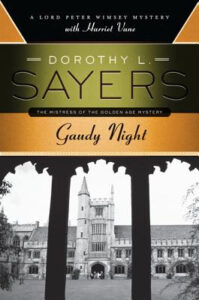Image by TAI-Design from Pixabay
I was a reader long before I became an editor. Mysteries have always been my favorite type of fiction and they dominate my bookshelf, but there’s also some variety. I have to be really enthusiastic about a book to write a review. These are titles I particularly enjoyed and highly recommend. If you see something you like, consider buying it from an independent bookseller.*
*Each cover image has a purchase link to Bookshop.org, an online store that donates 80% of its profits to independent bookstores. As an affiliate, I also get a 10% commission on each sale made through these links.
★★★★★★
GAUDY NIGHT
Dorothy L. Sayers
HANDS DOWN, my all-time favorite book. There’s no murder but lots of mayhem in this tale of crime and passion. Part mystery, part social commentary, part high-brow romance, part feminist manifesto, it blows the bounds of its genre. I give it a galaxy of stars.
Harriet Vane, a “Bloomsbury bluestocking” with a checkered past, screws up her courage to attend the gaudy (alumni reunion) at her Oxford college. Notoriety has been good for her book sales but wearing to her spirit. She met Lord Peter Wimsey at her lowest point in life and she’s been trying to shake him off ever since.
Wimsey is a caricature of an English peer and he knows it: fabulously wealthy, impeccably dressed, town and county, urbane, witty, educated, sharp-witted, and sensitive, and apologetic about it all. Everything he is keeps him from the person he loves.
Curiosity is the common ground that brings the writer and the detective together in this “romance interrupted by mystery”.
★★★★★
THE BOOK OF EELS
Patrik Svensson
SOMETIMES AN EEL—although the secret of its sexuality deeply frustrated Sigmund Freud—is just an eel. And sometimes it’s a metaphor for the holy grail of the psyche: the meaning of life.
From prehistory, Svensson relates, humans have had a complicated relationship with the eel; we’ve revered and demonized it, depended on it and distrusted it, embraced it and abused it. It plays a major role in many European cultures. Ironically, by refusing moderate their consumption of the eel, those communities threaten to destroy their cherished traditions.
Natural scientists obsessed over the European eel (Anguilla anguilla) for centuries, haunted by the “ghost of Aristotle”: the need to observe in order to know. Their research consumed countless eels, and still they knew very little about the creature. In the 300s B.C.E., after extensive dissection and fruitless observation, the esteemed philosopher himself decided that eels were sexless and spontaneously generated from mud.
A European eel has a singular aim in life: to return to its place of birth, reproduce, and die. Ignorance about its life cycle has contributed to centuries of overfishing, to the point of endangerment; the desire to understand it has done almost as much damage.
The Book of Eels examines humans’ Midas touch on nature: our greed, curiosity, and lack of foresight have brought about the extinction of many species we claimed to value and continue to threaten those that survive, to our own detriment.

